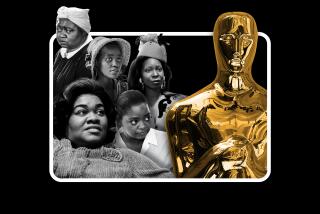The plain truths of Oscar winners
Ozark waitresses turned boxers. Los Angelenos battling over racial and social inequality. Boston’s criminal element and a do-gooder detective. A West Texas cowboy and a satchel of money. A slum kid from India and a game show. Bomb specialists in Iraq hooked on the drug of war.
On the surface, these plots — of “Million Dollar Baby,” “Crash,” “The Departed,” “No Country for Old Men,” “Slumdog Millionaire” and “The Hurt Locker” — have one thing in common: Oscars for best picture (in chronological order since 2005). But scratch deeper and there’s more going on: They’re actually all thorough character studies of the disenfranchised, from working class to straight-up poverty class.
Clearly there are outside influences on each win, but just how did we go from bawdy musicals (“Chicago,” 2003 winner) and computer-generated fantasy fests (“Lord of the Rings: Return of the King,” 2004 winner) to modern, naturalistic, character-driven storytelling for six years straight? On the one hand, it might say something about academy voters. Longtime working-class storyteller Mike Leigh, out this season with “Another Year,” suggests it means that “Oscar voters are growing up; these are mature choices in a way.”
But, in large part, it may be more of a commentary on the way movies are made, and honored, in the 21st century.
Simon Beaufoy won “Slumdog’s” adapted screenplay Oscar in 2009 (he’s back this year with director Danny Boyle for “127 Hours”) and says the greater the struggle, the more cathartic audiences find the story.
“In 90 minutes of cinema, you have to take your audience on a huge journey,” he says. “Audiences find a great sense of uplift when they see someone for whom the odds are really stacked against them go all the way on that journey. If you’re middle class and you’ve got enough money for a mortgage, house, and you have kids and a bottle of wine on a Friday night — it’s quite difficult to see the drama in that.”
“It’s story shorthand,” explains David McKenna, author of “Memo From the Story Department” (with Christopher Vogler). “Class ends up being an element that most storytellers are interested in because it creates immediate conflict.”
He notes that films of earlier generations also reveled in class-based character studies, such as “On the Waterfront” (1954), Oscar winner “Marty” (1955) and 1976’s “Taxi Driver.”
“Audiences had an appetite for the real,” McKenna says. “ Elliott Gould became a leading man — not someone like Montgomery Clift. There was this sense that with all of our bourgeois luxury, we’re getting away from our real roots, and there’s more truth on the street level.”
Hence, at least some of the success of the crime thriller “The Town” and Oscar winner “Departed,” which were both produced by Graham King. “There’s no question that it’s shorthand,” King says. “You couldn’t make ‘The Town’ and have Doug [ Ben Affleck] come from upper-middle-class Boston. It’s a different movie and character then.”
Having the stakes so high at the start allows more time for filmmakers to flesh out characters and at the same time keeps the kinetic motion of a film rolling along. But it’s still a jarring change from the traditional perception of Hollywood cinematic glamour.
According to director Tony Goldwyn, whose recent “Conviction” is set in working-class rural Massachusetts, audiences and voters alike want real-life daily contrast, “not the fantasies of the rich and powerful.
“There’s something raw about the blue-collar world. There’s an emotional honesty to the obstacles of life being with you every single day — more so than someone living in a rarefied environment.”
On some level, voters’ choices could also be interpreted as a way of trying to restore artfulness to modern filmmaking; an increased indie sensibility in critically lauded films has risen concurrently with the pejorative use of “Hollywood” or “studio” in describing a film’s provenance.
“I always thought there was nothing worse than going to a movie and seeing perfect people living perfect upper-crust lives, speaking in concise sentences and having clear epiphanies,” says Derek Cianfrance, the writer-director of the upcoming “Blue Valentine,” about the disintegrating relationship of a blue-collar couple. “Audiences don’t need to be manipulated like that anymore.”
Acceptance in the academy has given a wider berth to films based on hardscrabble stories — and directors are responding. Debra Granik all but went undercover to research the poor Appalachian areas where she filmed “Winter’s Bone,” and she says films like hers have audiences not just at home but also overseas.
“The rest of the world has been shown a mythology that all of American life happens poolside or in conspicuous ways,” she says. “It’s good to be able to show that it’s not all about unending affluence here.”
Leigh, unsurprisingly, is blunt about his audiences. He rarely worries that his class-based films will go unnoticed. “People love to see films they can identify with and that resonate in their own lives. Hitchcock famously said that a woman who spends all day washing and cleaning and ironing doesn’t want to go to the movies and watch a woman who spends all day washing and cleaning and ironing. In my experience, that is rubbish.”
More to Read
The biggest entertainment stories
Get our big stories about Hollywood, film, television, music, arts, culture and more right in your inbox as soon as they publish.
You may occasionally receive promotional content from the Los Angeles Times.










